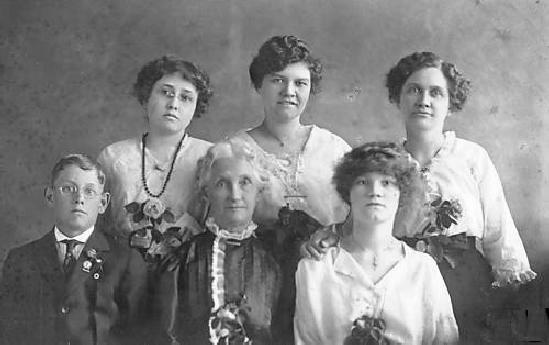
Figure 1.--This portrait shows an American boy about 1910 with all kinds of Sunday School awards. I am not sure who the ladies are. |

|
We believe that the Sunday school was particularly important in America. This is, however, only our initial assessment. We still have very little information about other countries. By the late 19th century the Sunday School movement was a major American institution. A great many American children attended Sunday school and vacation Bible schools in the 19th abd 20th centuries, including children tht were not from psrticulsly religious families. It was strongly associated with the Protestant churches. I think Catholic churches in America picked up on, but was still very Protestant, in part becsause it was conducted by lay teachers. We think sunday schools were also popular in Britain and the British dominions. We have very little information about other countries at this time. A factor here is thst umlike America, many European countries have religious instruction in the public schools.
There appear to hsave been Sunday Schools in colonial America. Sunday schools became increasingly important in the 19th century with the development of public schools in America. As churches lost control of schools, sunday schools became the medium by which the various denominations educated children in the dogma of the faith. They also provided activities to attract and hold the interest of children. Sunday schools not only had an educational purpose, but they were a way of providing "constructive" activities for children on Sunday. As far as we can tell, sunday schools were especially important for Protesants because Bible reading and study was much more important in Protestant denominations than the Catholic Church. In addition Catholics after they began arriving in large numbes in the 1840s (at first mostly Irish), set up their own school system with religious instruction part of the curriculum. There was a Protestant influence in early public schools, but this was limited by theological differences among the major denominations. By the late-19th century the Sunday School movement was a major American institution. We notice regional differences in the United States. The institution of the Sunday School was much more important in the northern United States than in the southern United States. Northern missionaries went south after the Civil War after which the Sunday School became a much more national institution.
We are not yet sure about the historical development of Sunday schools. One author dates the first Sunday school to Britain about 1790. The first formal international conference on Sunday schools was held in London (1862). It was held in connection with the International Industrial Exhibition. Delegates fron the different parts of Britain, SAmerica, Australia, and Eutope participsted. [Rice, p.367.]
I am not at all sure this predated developments in northern Germany and other Protestant sttes on the continent. As there was religious instruction in the schools, there would seem to have been less need for Sunday schools in Germany. A German reader writes, "here are sunday school in Germany, but never as commonly as in America. In my childhood during the 1980s, I did not know any child attending a sunday school."
A Dutch reader tells us, "Sunday School was not common at all in the Netherlands when I was growing up in the 1930s. As a matter of fact I had never heard of it as a boy. There were public schools without any religious imstruction (although they allowed Bible teaching once a week after school), there were catholic schools and Dutch reformed schools. I myself went to a reformed (calvinist) school, because there was no other school in the village, not because my parents were religious. All classes opened and closed with praying and singing a hymn. That there are so many sunday schools in South Africa surprises me. The Afrikaners still are very religious, while the majority of the Dutch population has said goodbye to the church and its teachings."
We do not know a great deal about Sunday schools in South Africa. It was the Dutch who founded a colony at the Cape (1652). We do not know to what extent the Dutch Refored Church had Sunday schools in the early history of the Cape. The British seized the Capoe Colony during the Naopoleonic War. It became a Crown Colony (1814). This meant thst British churches could exert an influence in South Africa and by this time the Sunday School Movewement was growing. One author suggests that the various deominations extensively used Sunday schools to spread the faith among African communities. [Sunderland Steed, p. 356.] We have little information about the popularity od Sunday Schools in South Africa and differemnces among the different denominations, includng the Dutch Reformed Church (DRC). Sunday schools are very common in South Africa today. And this includes the DRC.
Rice, Edwin Wilbur. The Sunday-school movement and the American Sunday-School Union.
Sundkler, Bengt and Christopher Steed. A History of the Church in Africa
Navigate the Boys' Historical Clothing Web Site:
[Return to theMain Sunday school page]
[Introduction]
[Activities]
[Biographies]
[Chronology]
[Clothing styles]
[Countries]
[Bibliographies]
[Contributions]
[FAQs]
[Glossary]
[Images]
[Links]
[Registration]
[Tools]
[Boys' Clothing Home]
